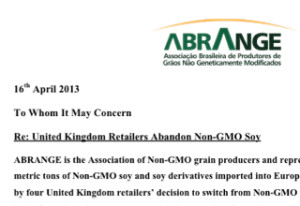Brazilian non-GM soy producers are “puzzled” by the decision of four UK retailers to allow GM soy into their suppliers’ animal feed on a disingenuous pretext that Brazilian soy was supposedly in short supply. Ricardo Tatesuzi de Sousa, executive director of the Brazilian non-GM soy producers’ association ABRANGE explained in an open letter that his membership accounts for more than five million tonnes of non-GM soy bound for Europe and the UK.

In the wake of Brazil’s record 82 million-tonne soybean harvest, Tatesuzi de Sousa estimates that a quarter of that tonnage is non-GM. The real problem in Brazil at the moment is that export demand is so high that port facilities are saturated: in some ports ships have to wait for a month and more, just to dock and load. “This situation is temporary, as exporters are actively seeking solutions to circumvent the export slow down,” Tatesuzi de Sousa writes, adding: “Considering national affiliations, this change could well have as much to do with interest in opening the UK to imports of GM soy from the USA than to the temporary slow down in Brazil.”
Tatesuzi de Sousa quoted an FSA poll in which two thirds of UK citizens prefer milk, eggs, poultry and meat produced with non-GM feed. “In light of this, it is surprising that UK retailers have used the current, temporary shipping slowdown, and the consequent temporary increase in the cost of all soy (GM and Non-GM) as the basis for shifting to GM soy for animal feed.” Mainland European retailers responding to temporary soy price rises, he added, “by making strenuous efforts to even expand the Non-GMO soy supply chain.”
UK consumer preferences does not appear to matter to British retailers, it would seem. Earlier this year the UK Food Standards Agency published a 129-page study of consumer attitudes to GM foods . Researchers found a public awareness vacuum on the subject, but found that consumers rapidly woke up to the issues and responded more critically when given even limited information ahead of qualitative interviews.
The UK retailers have given a perverse priority given to misinforming the public about a non-existent shortage of non-GM soy. They cannot be relied upon to supply hard facts of any description about the likely impact of such wilful distortion.





